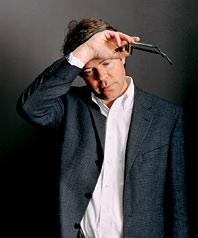
Fairly or not, Jonathan Franzen—author of The Corrections and famous spurner of Oprah—has developed a reputation as a bit of a curmudgeon. It might not help matters that the former German- lit major has just published a new translation of Spring Awakening, Frank Wedekind’s century-old play about dangerously repressed adolescents—and that his foreword lambastes the “insipid” and “instantly overpraised” Broadway musical adaptation. Franzen spoke with Boris Kachka.
So what’s your beef, exactly?
I care a lot about American theater, and I’m loath to criticize any spark of excitement anywhere. But what happened to the play is, I think, it became dishonest on the road to being that musical. The real way to any theatergoer’s heart is to tell some kind of truth about their experience, not flatter them with some kind of pleasant lie they’d like to tell themselves. It turns it into a kind of self-righteous Avril Sévigné…[A follow-up e-mail confirmed that, in fact, he meant pop star Avril Lavigne.]
So this is why you decided to try your own translation?
No. Fifty dollars made me do it in 1986 for the Swarthmore College theater department. It was a memorable production. It sat in a drawer for twenty years, and when the musical came along I remembered it. I knew it was a good translation, better than anything else out there.
One of the essays in your memoir, The Discomfort Zone, connects your love of German lit with your own sexual awakening. Is that why you love this play so much?
The play appealed to me primarily because it’s just rocking good. It’s funny and the characters are amazingly vivid. That’s why I’m so cruelly hard on a basically sunny Broadway musical. This stuff does matter to me—the German-literature stuff and the teen-sex part, it all matters.
Do you expect critics to whip out the elitist label again after they read this foreword?
Except for Harper’s, for whom I’m too populist. Having been through it once, I’m less afraid to go through it again. The fact is, I position myself in the middle. I am a theatergoer who has a brain, who knows the difference between good and bad, who wants to enjoy himself but also doesn’t want to have to put his brain to sleep.
Surely there was something redeeming about Spring Awakening?
There are four good musical numbers in there. What was unsatisfying was the disconnect between the excitement of those rocking numbers and the ostensible themes of the play.
Is there anything you really loved recently in the theater?
I actually saw The Drowsy Chaperone twice. I love it. Twice I came out just bursting from laughter, really in physical pain.
Anything you’ve hated?
If you want an example of what I think theater should not be, Embedded is a good example. I practically came out of Embedded ready to join the Republican Party.
Were you pained by the oddly personal takedowns of The Discomfort Zone in two reviews in the Times?
I have a theory about that. That book is my effort to acknowledge my complicity and my guilt—for instance in global warming. It didn’t seem entirely accidental to me that the newspaper which has had a hard time acknowledging its own complicity, say, in the Iraq debacle and the reelection of George Bush, might find any sort of confession of guilt unwelcome. You know it’s mostly nonsense what I’m saying, but I’m irritated enough to actually say it to somebody clattering away on his keyboard.
Has it been harder to write now that you’re a big success?
It’s certainly not something I would complain about. My first twenty years were one long slog of delayed gratification. [The Discomfort Zone] was a book written by a happier person.
Did you feel vindicated recently when Nan Talese, James Frey’s publisher, lashed out at Oprah for the way she wields her power?
I don’t really comment on that stuff anymore. I try to resist the megalomania that would make me think anyone cares.
Spring Awakening: A Play
Faber & Faber.
